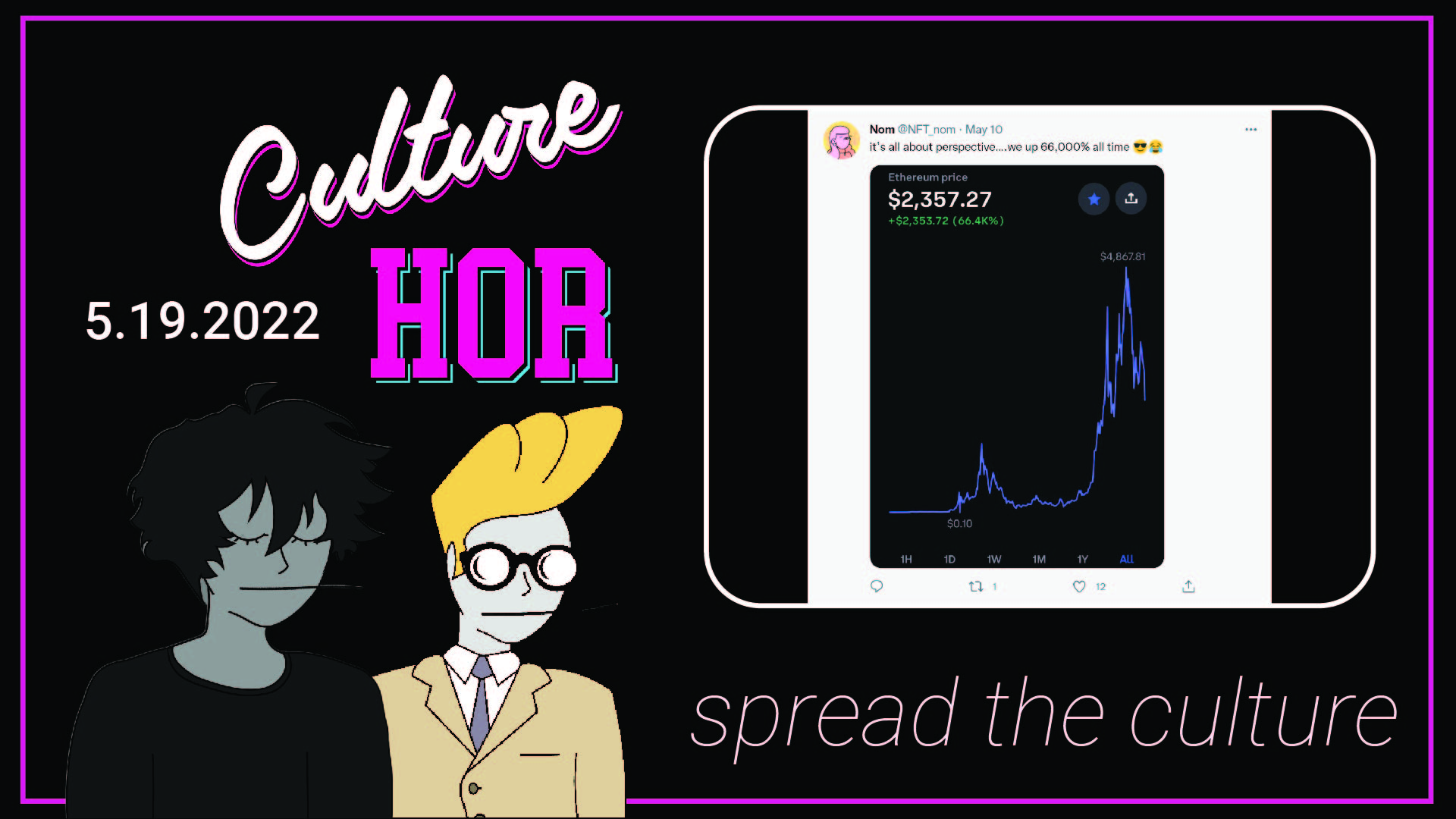Finding the humor and hope in everything while being told to be humorless and hopeless feels more important than ever today on the Internet.
Alexa, play: When The World Was At War We Kept Dancing.
Chad & El Prof
Markets
(Price changes reflect past 24 hours as of 3.3.22 @ 4:20 PM EST.)
- I mean, yeah, we ate shit again, but on the plus side, the New York Stock Exchange is entering the NFT game. The deep state’s betting on it, so things will definitely stabilize for us average hodlers again… right?

The lady doth protest
Back in 2009, when I was an impressionable, angst-fueled high school freshman who did ironic things unironically, like wear pink leopard print skinny jeans and listen to Twisted Sister, I made my mom take me to see Rock of Ages on Broadway. It was not good. Hair metal, the genre honored by the play, was not good. But ‘good’ is far from the only factor in music’s cultural significance — in 2009, Billboard also named Nickelback the group of the decade. The musical’s showstopper, ‘We’re Not Going To Take It’, has recently demonstrated this, in both vigor and vomit inducing ways.
Twisted Sister’s 1986 hit is a mind-numbing onslaught of tutorial level drum patterns and power chords, with a hook designed to be played in 30 second clips over football stadium speakers, delivered by adult men dressed like D&D kobold LARPers. Granted, that was the prevailing aesthetic of the times, and by mid-80s metrics, it’s actually a bit of a slapper. It’s also no wonder it’s taken on a second life as a politically charged protest song — its lyrics, apparently stripped from the margins of a middle schooler’s notebook, are so devoid of specificity and flavor that the song can be easily weaponized to support literally any cause.
In both 2012 and 2016, Dee Snider, the songwriter, put Paul Ryan and Donald Trump on blast for using the song in their respective campaigns. And, in 2019, Australian businessman and certified climate fucker Clive Palmer was found liable for $1.5M in damages for using the song in his nationalist political party’s media campaign. Days ago, however, this trend was reversed, when Snider publicly approved of Ukraine’s use of the song as a rallying cry against Russian invaders. With protest songs all but gagged by the modern music industry, it’s nice to see the power of familiar, melodic sounds demonstrated yet again — even if said melody is just ‘O Come, All Ye Faithful’ jammed out on an Epiphone Elitist in open tuning.
The song’s story doesn’t end there, though. In a show of the sort of appallingly poor taste you can only find on the blockchain, the very same day Snider expressed his support for Ukraine, Randi Zuckerberg — best known for possessing the world’s most famous strain of lizard DNA — tweeted out her own version of the song. A ‘rallying cry’, too, in fact. But not for the millions displaced by a dictator’s inferiority complex… God, no. For ‘the women of web3. Together we can accomplish anything. And have fun doing it! #WAGMI’.
The video can be viewed above, or in the original tweet, if the copyright claims kills our bootleg upload by the time we get around to sending this email out to y’all. Obviously, I, too, support women who want to find equitable economic opportunities on web3. But Randi, for fuck’s sake, this was not the way to show it. The broad slapstick comedy of the OG Twisted Sister MTV hit has been replaced by Kendall-Jenner-Pepsi-commercial level acting. And the lyrics have been rewritten to force a 3000-calorie helping of crypto acronyms and slang down our throats, culminating in the new chorus: ‘We’re all going to make it’, or, yeah, #WAGMI.
It is, in short, bad. Not not good. Not so bad it’s good. It is bad. So bad, in fact, it gave me mild gastrointestinal distress upon the repeat viewings I’m obligated to do to bring y’all this hard-hitting news. As an apparently Ukrainian Twitter commenter put it, ‘I’m in a bunker, and this just made my day worse’. But worst of all, I soon realized #WAGMI was the ultimate repeat viewing for me. Because Randi Zuckerberg, turns out, is also a Broadway performer. The one who sang the same song in the original production of Rock of Ages I saw back in 2009.
I should’ve known. History repeats itself. It’s being proved out on a geopolitical scale, and in the annals of my Internet search history. More on the former in a moment, but we wanted to keep it as light as possible for as long as possible today. That’s what music’s for, after all. Bringing us together to laugh, fuck, and fight when the whole world’s trying to stop us.
(Actually, scratch that middle one. If Twisted Sister’s on your sex playlist, you are twisted, sis, indeed.)
War3 II
On Tuesday, we discussed the stalemate playing out between the U.S., Russia, and Ukraine in a proxy war fought over web3. TL;DR:
- Russia could theoretically use crypto to replace the ravaged ruble,
- The U.S. could leverage these concerns into prohibitive regulations, and
- Ukraine’s reliance on crypto donations raises red flags regarding the blockchain’s role in conflicts moving forward.
Now, in a mere 48 hours, the grueling content gears have ground our posititions into pulp, forcing us to respond again. The Polisci major in me knows war is just an information problem. So here we go:
1.) Jake Chervinsky, Head of Policy at the Blockchain Association, tweeted an exhaustive (/ing) thread arguing that Putin ‘can’t and won’t’ use crypto to evade sanctions. By Twitter discourse standards, he makes some compelling points. Most of the sanctions we’ve put into place just mean that, for a collection of SDNs (‘Specially Designated Nationals’ including Putin, his government, and oligarch friends), it is now illegal to exchange money with U.S. parties (companies, citizens abroad, individuals living here). Whether that money is in ‘dollars, gold, sea shells, or Bitcoin’, the U.S. parties would face legal penalties for breaking the sanctions.
So, Chervinsky says, ‘there’s zero reason to think’ U.S. parties would be more comfortable transacting via an anonymous currency designed to purchase drugs off the Internet without repercussions than via a wire transfer from the Bank of America to Vladimir Putin. Which, yeah, totally checks out to me. He goes on to tout on-chain transparency and U.S. analytics capabilities as reasons Russia can’t use crypto anonymously, and points out that Putin’s years-long push to sanctions-proof Russia revolved around yuan and gold, not crypto.
Makes sense, except extensive research reveals use cases in almost a dozen countries, Russia included, of crypto-enabled sanction dodging. And, hours ago, Chervinsky shared the Treasury Department’s warning that Russia’s cyber-attacks may soon extend to crypto wallet heists, suggesting his followers liquidate their digital assets ASAP. Of course, his concern seems to be less about the Kremlin’s now-intelligence-supported interest in crypto and more about ‘what Congress or regulators might do in a tense situation like this’, which leads us to…
2.) Earlier today, MetaMask and Infura, both major user bridges to the Ethereum blockchain, went down in Venezuela due to ‘legal compliance issues’. Service was restored hours later, but not before stoking the obligatory Internet outrage. Larry Cermak, VP of Research at The Block, tweeted: ‘If Metamask/Infura is open and willing to block countries like Venezuela by IP addresses, it’s only a matter of time until they are forced by regulators to censor individual people’s IP addresses.’
We’ve already seen the beginnings of this in the Russo-Ukrainian War, with Coinbase and Binance agreeing to block accounts of sanctioned SDNs, but stopping short of the blanket ban on all Russian accounts called for by Ukraine. The U.S. government has also gotten better at recovering stolen cryptocurrency, although their tactics for doing so are, as of yet, unclear.
I personally am in support of corporations adhering to government demands to stimy war crimes. But for the libertarian-est degens, it’s a healthy reminder that, as long as access to web3 resources is facilitated by companies with the organizational playbooks of web2 — centralized, private corporations acting as gatekeepers — the government will have a significant say over who has access to the technology. So, either figure out a way to use the blockchain on your own terms, or hit up your local library and borrow a copy of The Golden Notebook. Adapt or accept.
3.) Ukraine has now received ~$48M in crypto donations since the start of the war a week ago — as much as the ConstitutionDAO raised in the same time period. (I’m now realizing that’s kind of a depressing comparison, but this is the Internet, after all.) However, while lucrative, their crowdfunding efforts have also been messy, as predicted.
Scammers are already appropriating the conflict for their own gain, posing as official channels calling for donations. And while the real channels are raking in real cash, they’re also being filled with shit like this:

The editor-in-chief over at Decrypt echoed our sentiment that, even while it’s clearly called for in this specific situation, crypto’s newfound influence in world conflicts is not necessarily a net positive. The Canadian trucker protests, for instance, were sustained almost entirely by Bitcoin, and, while the protestors were celebrated on web3 Twitter, citizens of the country reportedly had a different response to foreign money funding a radical minority blocking their borders.
Anyway, the point of this State of the Decentralized Autonomous Union Address has mainly been to say: Prediction is the lowest form of journalism. And it should now be quite obvious no one can read Putin’s mind, or our President’s, or the general tenor of humanity. So, rather than weave together intricate arguments about why our visions of the future are the most valid, maybe it’s time to educate ourselves and prepare for whatever version comes to pass.
Here are tangible ways to support Ukraine. Please do not send Shiba NFTs.
DeGen = depressed generation

Last night, I finished the latest season of Euphoria, which has been called the ‘TV Show Of A Generation’ by at least one of my friends and/or half of Reddit. For my money, it’s merely the latest in a long line of borderline incoherent trauma porn written by white dudes on drugs, only with a younger and more diverse cast and a strong secondary market as PornHub clips. But my money is in Tezos, so take it as you will.
I could fill a dissertation with my armchair psych eval of Sam Levinson, but we’re a culture publication, and culture is one thing Euphoria is decidedly not. So, have no fear. No spoilers here but the obvious: like every other episode of the show, the finale is a string of non-linear, broadly written vignettes with no thematic throughline other than being uniformly clinically depressing. Of course, that doesn’t stop me from tuning in every week, and I know I’m not alone. So, I wondered, if this show’s nothing but a distilled audiovisual panic attack, how is it also the Show Of A Generation?
To be fair, there’s always been a market for trauma porn, long before the term was coined back in 2014. But it seems now more than ever to capture the zeitgeist in a singular way. Look at A Little Life — basically a novel-length justification for a gay man’s suicide — which practically birthed ‘literary TikTok’ last year. Or Depression Twitter. Or Lana Del Rey. Or, like, the mainstream news media, for hell’s sake. By virtue of writing about the Internet and the future, I spend a lot of time thinking about our generation. What defines us? How will we be remembered? At last, answers emerge: by our poor taste in entertainment and SSRI dependencies.
Now, obviously, there are easy culprits to point to. Americans in my generation came of age right as our country was in Squid Game worthy debt, electing fascists, torturing prisoners of war, waving nukes around like jock straps, killing its own citizens for hanging air fresheners in their cars, denying the imminent millennium of natural disasters we’ve collectively caused. The rest of the world didn’t fare much better, from what I recall. At the same time, what’s new? We’ve feared Russia’s nukes for decades, weathered economic crashes for longer, known about the greenhouse effect since the early 1800s, and promoted genocide since the Mayflower. Why is it just now getting to us?
I’ll admit I don’t have an answer. I’m writing only my observations, not my judgement. To those of y’all who’ve been reading for a while, you know it gets to me, too. How could it not? Depression comes from every angle: our feed, our news, our streaming services, our music. And, as of last week, we’ve got a real event, unprecedented in our lifetimes in its proximity to our own lives, to tie our depression to: a European land war playing out on the Internet in real time. So, yes, I’m predisposed to hijack my own platform to air an existential crisis, as we’re all want to do.
But I will say, there’s a reason I find myself returning to write about web3 degens — the decentralized generation, not the depressed one — week after week. For all their right-click-saving, billion-dollar-ape-JPG-buying, DAO-funded-country-clubbing delusions, the prevailing emotion on the blockchain is optimism. Silly, blissful, unconsciously destructive optimism, to be sure. But is it worse than the web2 algo-incentivized shitposts and Marvel-ized super cuts of the Ukrainian invasion? The conscious destruction everywhere else? All I know is, it’s not worse for my mental health. And, to help the world, first, you’ve got to help yourself.




